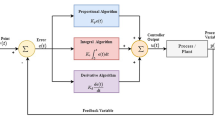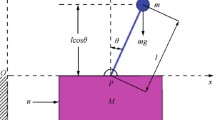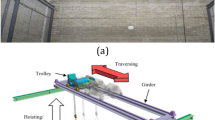Abstract
Two surge interactive and non-interactive tank systems are taken as examples of multi-level tank system. Due to the dynamic level changes of the two-tank system, various control techniques are intended to regulate the level by controlling the liquid inflow quantity. In addition to that, disturbance effect is considered to get better step response for the tuning of Proportional Integral Derivative (PID) controller by using meta-heuristic algorithm. In this paper, Proportional Integral Derivative (PID) controller design analysis is carried out by using Feed Forward (FF) control, Genetic Algorithm (GA), Particle Swarm Optimization (PSO) and Bubble Net Whale Optimization Algorithms (BNWOA). BNWOA is used to tune the PID controller to reduce constrains of two tank system and obtain the optimal control is proposed. The transfer function of the two-tank system with step input for various control algorithms such as GA, PSO and BNWOA are observed using MATLAB Simulink and M-script. From the analysis, better performance such as reduced constrains and optimal control can be obtained from BNWOA. Then steady state analysis is made and the simulation results are presented at the end.































Similar content being viewed by others
References
Vasičkaninová A, Bakošová M, Karšaiová M, Kmeťová J (2013) Methods for controller tuning for unstable systems. In: IEEE International conference on process control (PC), pp. 208–213. https://doi.org/10.1109/PC.2013.6581410
Rani LT, Deepa N, Arulselvi S (2014) Modeling and intelligent control of two-tank interacting level process. Int J Recent Technol Eng (IJRTE) 3(1):30–36
Medewar PG, Sonawane RR, Munje RK (2017) Two tank non-interacting liquid level control comparison using fuzzy and PSO controller. IOSR J Electri Electron Eng 1:24–31
Davis I, Jishnu CP, William R (2017) Level control of two conical tank non-interacting system using PID and fuzzy logic. Int J Innov Res Electr Electron, Instrum Control Eng 5(4):35–42
Srinivasan K, Sindhiya D (2016) Design of fuzzy based model predictive controller for conical tank system. In: IEEE International conference on control and robotics engineering (ICCRE). https://doi.org/10.1109/ICCRE.2016.7476135
Abdalla SA, Mohamed AIM, Ali EA, Nawari MO (2019) Level control of horizontal cylindrical tank. In: IEEE International conference on computer, control, electrical, and electronics engineering, international conference on computer, control. https://doi.org/10.1109/ICCCEEE46830.2019.9070896
Ravi R, Thyagarajan T, Puviyarasi B (2012) Centralised neuro controller for two conical tank interacting level system. In: IEEE International conference on advanced communication control and computing technologies. https://doi.org/10.1109/ICACCCT.2012.6320799
Lakshmanaprabu SK, Banu US, Karthik D (2015) Real-time implementation of multi-loop internal model controller for two interacting conical tank process. In: IEEE International conference on innovations in information, embedded and communication systems. https://doi.org/10.1109/ICIIECS.2015.7193213
Uvais M, Sarkar PR (2016) Three tank interacting system level control using modern AI techniques. Int J Res Dev Appl Sci Eng 9(1):1–5
Nagammai S, Latha S (2016) Design of optimal controllers for a three tank process. J Sci Innov Res 5(2):65–70
Singh AK, Kumar S (2014) Comparing the performance analysis of three tank level control system using feedback and feedforward -feedback configuration. In: IEEE International conference on advanced communication control and computing technologies. https://doi.org/10.1109/ICACCCT.2014.7019439
LeBlanc SE, Coughanowr DR (2009) Process systems analysis and control, 3rd edn. McGraw Hill publishers, New York
Shah P, Hanwate S (2020) Modelling and simulation of quadruple tank system using SBL-PI controller. In: International conference on industry 4.0 technology.https://doi.org/10.1109/I4Tech48345.2020.9102644
Maxim A, Ionescu C, De Keyser R (2016) Modelling and identification of a coupled sextuple water tank system. In: IEEE International conference on automation, quality and testing, robotics (AQTR). https://doi.org/10.1109/AQTR.2016.7501360
Wong WK, Ming CI (2019) A review on metaheuristic algorithms: recent trends, benchmarking and applications. In: 7th International conference on smart computing & communications (ICSCC).https://doi.org/10.1109/ICSCC.2019.8843624
Zhou K, Yan B, Jiang Y, Huang J (2012) Double-tank liquid level control based on genetic algorithm. In: International conference on intelligent human-machine systems and cybernetics, 4th IEEE International conference on intelligent human-machine systems and cybernetics, pp. 354–357.https://doi.org/10.1109/IHMSC.2012.180
Kumar AA, Kumar SG (2018) Application of whale optimization algorithm for tuning of a PID controller for a drilling machine. In: Second international conference on advancements in automation, robotics and sensing (ICAARS).https://hal.archives-ouvertes.fr/hal-02314429/document
Mukherjee A, Chakraborty N, Das BK (2017) Whale optimization algorithm: an implementation to design low-pass FIR Filter. In: Innovations in power and advanced computing technologies (i-PACT). https://doi.org/10.1109/IPACT.2017.8244929
Prasad D, Mukherjee A, Shankar G, Mukherjee V (2017) Application of chaotic whale optimisation algorithm for transient stability constrained optimal power flow. IET Sci Meas Technol 11(8):1002–1013. https://doi.org/10.1049/iet-smt.2017.0015
Zhong1 M, Long W (2017) Whale optimization algorithm with nonlinear control parameter. In:MATEC web of conference
Mosaada AM, Attiaa MA, Abdelaziz AY (2019) Whale optimization algorithm to tune PID and PIDA controllers on AVR system. Ain Shams Eng J 10(4):755–767
Author information
Authors and Affiliations
Corresponding author
Additional information
Publisher's Note
Springer Nature remains neutral with regard to jurisdictional claims in published maps and institutional affiliations.
Appendices
Appendix 1

Appendix 2

Rights and permissions
About this article
Cite this article
Amuthambigaiyin Sundari, K., Maruthupandi, P. Optimal Design of PID Controller for the analysis of Two TANK System Using Metaheuristic Optimization Algorithm. J. Electr. Eng. Technol. 17, 627–640 (2022). https://doi.org/10.1007/s42835-021-00891-6
Received:
Revised:
Accepted:
Published:
Issue Date:
DOI: https://doi.org/10.1007/s42835-021-00891-6




